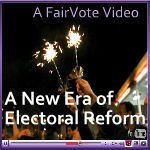 The Spring 2008 student election season brought another successful round of IRV and Choice Voting elections. FairVote estimates that at least 30,600 students voted in IRV and Choice Voting elections for student government in nine Colleges. Already used by more than half of the nation's top thirty universities (based on rankings by U.S. News and World Report), the IRV has been recently adopted by students at UCLA, North Carolina State University, Santa Fe College (FL) and the University of Iowa, where IRV was used for the first time this year with the highest turnout student election ever.
The Spring 2008 student election season brought another successful round of IRV and Choice Voting elections. FairVote estimates that at least 30,600 students voted in IRV and Choice Voting elections for student government in nine Colleges. Already used by more than half of the nation's top thirty universities (based on rankings by U.S. News and World Report), the IRV has been recently adopted by students at UCLA, North Carolina State University, Santa Fe College (FL) and the University of Iowa, where IRV was used for the first time this year with the highest turnout student election ever.Implementing IRV and other innovative voting methods like Choice Voting boosts student participation in their elections. Among several examples, California State University at Chico has shown impressive gains in voter turnout since the voting system adoption. Voter turnout at CSU Chico increased by more than 2,000 students from 2,601 pre-IRV to 4,717 in recent post-IRV elections.
Rob Richie, executive director of FairVote, applauds students’ openness to innovation and improving elections: “The last decade has opened many Americans’ eyes to the need to upgrade our elections. Electing majority winners in a single round of voting is a great example. The fact that so many students have taken this step points to our expectation that it will become the norm many our top elections.”
[Read the New FairVote Press Release on Student Elections Using IRV]
[See which Colleges are Using IRV with information on Election Results and Bylaws Language]
[Read Students’ Testimonies]
[See Detailed Choice Voting Election Results at UC Davis Dated Spring 2008]
[Read NC State Technician Online’s Breakdown on How IRV Works]
[Become an IRV Advocate at your University]







 On June 6, Senator Bill Nelson (D-Florida) introduced S. 3100, a bill that would encourage advance voter registration for sixteen year olds, and automatic re-registration of voters who changed their residence. S. 3100 would create a grant program to provide the States with the funds needed to implement pre-registration for sixteen year olds, so ensuring that they would be on the voter rolls when they turn eighteen. Pre-registration, combined with automatic re-registration, would be a significant step towards FairVote's goal of universal voter registration. The bill also makes provision for absentee voting, mail-in voting, and vote verification through paper trails and manual audits.
On June 6, Senator Bill Nelson (D-Florida) introduced S. 3100, a bill that would encourage advance voter registration for sixteen year olds, and automatic re-registration of voters who changed their residence. S. 3100 would create a grant program to provide the States with the funds needed to implement pre-registration for sixteen year olds, so ensuring that they would be on the voter rolls when they turn eighteen. Pre-registration, combined with automatic re-registration, would be a significant step towards FairVote's goal of universal voter registration. The bill also makes provision for absentee voting, mail-in voting, and vote verification through paper trails and manual audits. 